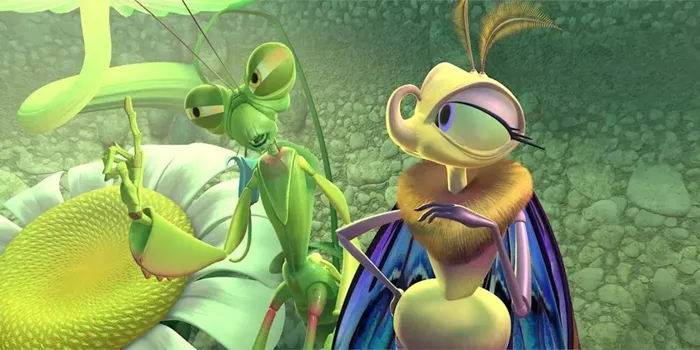“A Bug’s Life,” Pixar’s second feature-length animated film released in 1998, enchanted audiences with its vibrant animation, endearing characters, and captivating story. Set in a bustling insect colony, the film follows the journey of Flik, an inventive ant, as he rallies his fellow insects to fend off a group of menacing grasshoppers. Behind the scenes, the making of “A Bug’s Life” involved groundbreaking technology, creative ingenuity, and meticulous attention to detail. In this comprehensive article, we delve into the fascinating process of how “A Bug’s Life” was filmed, exploring the animation techniques, visual effects, and behind-the-scenes magic that brought the miniature world of insects to life.
A Bug’s Life
Setting the Scene
“A Bug’s Life” takes place in an imaginative world where insects live and thrive in a vibrant ecosystem. From the bustling ant colony to the towering blades of grass, the film’s setting is rich in detail and brimming with life.
Character Ensemble
The film features a diverse cast of insect characters, each with their own unique personality and traits. From the determined and resourceful Flik to the charismatic and villainous Hopper, the characters of “A Bug’s Life” captivated audiences with their depth and charm.
The Animation Process
Traditional Animation Techniques
Like many animated films of its time, “A Bug’s Life” relied on traditional animation techniques to bring its characters and world to life. Skilled animators meticulously crafted each frame by hand, using pencil and paper to sketch out the movements and expressions of the characters.
Digital Animation Advancements
In addition to traditional animation, “A Bug’s Life” utilized cutting-edge digital animation technology to enhance its visuals and bring its intricate world to life. Pixar’s proprietary animation software, RenderMan, played a crucial role in rendering the film’s complex scenes and environments.
Character Design and Modeling
The character design process involved creating detailed 3D models of each insect character, which served as the basis for their animation. From the fuzzy texture of Flik’s antennae to the glossy sheen of Hopper’s exoskeleton, every detail was meticulously crafted to achieve a lifelike appearance.
Animating Movement and Expressions
Animating insects presented unique challenges due to their small size and complex anatomy. Animators studied real-life insect movement and behavior to ensure authenticity, while also imbuing the characters with expressive gestures and emotions to make them relatable to audiences.
Visual Effects and Cinematography
Creating a Miniature World
To evoke the sense of scale and perspective necessary for a film set in a world of insects, the filmmakers employed clever visual effects and cinematography techniques. Wide shots of the insect colony and sweeping landscapes helped establish the vastness of the environment, while close-up shots emphasized the tiny details of the insects’ world.
Lighting and Atmosphere
Lighting played a crucial role in setting the mood and atmosphere of “A Bug’s Life.” Sunlight filtering through blades of grass, dappled shadows cast by overhead leaves, and the warm glow of firefly lanterns all contributed to the film’s immersive visual experience.
Dynamic Camera Work
Dynamic camera movements and angles were used to enhance the action and drama of key scenes in “A Bug’s Life.” From sweeping aerial shots to intimate close-ups, the camera work helped convey the urgency of the insects’ struggle against the grasshoppers and brought viewers closer to the heart of the story.
Behind the Scenes: Bringing the World to Life
Research and Inspiration
The filmmakers drew inspiration from nature and real-life insects to create the world of “A Bug’s Life.” Extensive research and observation of insect behavior, habitats, and anatomy informed the design of the film’s characters, environments, and story elements.
Collaborative Effort
The production of “A Bug’s Life” was a collaborative effort involving animators, artists, technicians, and storytellers working together to realize the vision of the film. From concept art and storyboarding to animation and sound design, each department contributed their expertise to the creative process.
Iterative Process
Creating a fully realized world of insects required countless iterations, revisions, and refinements throughout the production process. Animators experimented with different character designs, lighting setups, and animation techniques to achieve the desired look and feel for the film.
Legacy and Impact
Innovative Technology
“A Bug’s Life” pushed the boundaries of animation technology and paved the way for future advancements in the field. The film showcased the power of computer-generated imagery (CGI) to create immersive worlds and lifelike characters, setting a new standard for animated storytelling.
Cultural Influence
The success of “A Bug’s Life” resonated with audiences worldwide and left a lasting impact on popular culture. The film’s memorable characters, heartfelt story, and stunning visuals have earned it a place among the classic animated films of its era.
Continued Inspiration
“A Bug’s Life” continues to inspire and captivate audiences of all ages, serving as a reminder of the creative ingenuity and storytelling prowess of Pixar Animation Studios. Its enduring popularity is a testament to the timeless appeal of animated storytelling and the enduring magic of cinema.
Conclusion
The making of “A Bug’s Life” involved a blend of traditional animation techniques, cutting-edge technology, and creative ingenuity to bring its miniature world of insects to life. From the meticulous design of its characters and environments to the innovative use of visual effects and cinematography, every aspect of the filmmaking process contributed to the magic and charm of the final product.
As audiences continue to revisit the world of “A Bug’s Life” and discover its timeless story and characters, the film’s legacy lives on as a testament to the power of imagination, collaboration, and storytelling in the world of animation.

